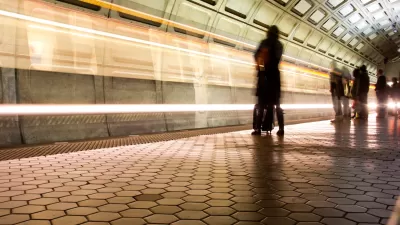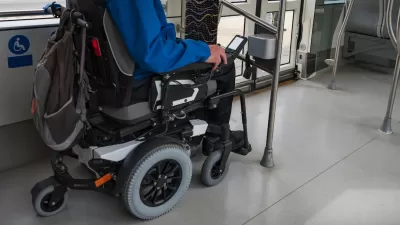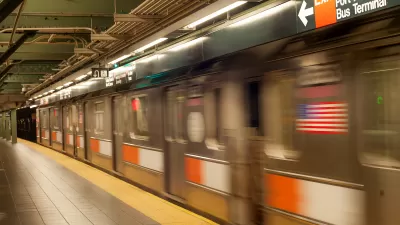The program would fund improvements such as elevators, ramps, and accessible ticketing equipment to bring the nation's transit stations up to ADA standards.

The All Stations Accessibility Program (ASAP) Act aims to bring all transit stations up to ADA standards and improve accessibility on the nation's passenger rail systems. Jason Plautz reports on the bill for Smart Cities Dive.
"According to data from the FTA, nearly 20% of the nation’s transit stations were not ADA accessible in 2019, the most recent year data was available." In New York City, "200,000 disabled New Yorkers lived in neighborhoods without an accessible station." The bill would create a $10 billion grant program to help local and regional agencies address accessibility issues.
"Smaller systems may struggle to gather the funding it takes to retrofit stations built before the ADA was passed. Under the ADA, transportation facilities built after January 25, 1992, must be readily accessible and useable by people with disabilities. If an agency alters a facility built before that date, those altered portions must also be readily accessible and useable. That can include elevators, curb ramps, level boarding, ramps or lifts in buses and accessible ticketing equipment."
Jinny Kim, director of the disability rights program for San Francisco-based Legal Aid at Work, says her organization has been "suing public entities for a long time over accessibility. It’s a matter of agencies spending money and prioritizing it to make sure all people have access to their services." The funding provided by the bill, she says, would give transit agencies "no excuse."
"W. Robert Schultz, a campaign organizer at Chicago-based Active Transportation Alliance, said cities also need to consider "how people get to and from train and bus stations," which requires more focus on pedestrian infrastructure and sidewalk repair on top of the transit station work. A total focus on accessibility, he added, is necessary to make transportation equitable."
FULL STORY: A $10B federal proposal to improve transit station accessibility

Maui's Vacation Rental Debate Turns Ugly
Verbal attacks, misinformation campaigns and fistfights plague a high-stakes debate to convert thousands of vacation rentals into long-term housing.

Planetizen Federal Action Tracker
A weekly monitor of how Trump’s orders and actions are impacting planners and planning in America.

In Urban Planning, AI Prompting Could be the New Design Thinking
Creativity has long been key to great urban design. What if we see AI as our new creative partner?

Pedestrian Deaths Drop, Remain Twice as High as in 2009
Fatalities declined by 4 percent in 2024, but the U.S. is still nowhere close to ‘Vision Zero.’

King County Supportive Housing Program Offers Hope for Unhoused Residents
The county is taking a ‘Housing First’ approach that prioritizes getting people into housing, then offering wraparound supportive services.

Researchers Use AI to Get Clearer Picture of US Housing
Analysts are using artificial intelligence to supercharge their research by allowing them to comb through data faster. Though these AI tools can be error prone, they save time and housing researchers are optimistic about the future.
Urban Design for Planners 1: Software Tools
This six-course series explores essential urban design concepts using open source software and equips planners with the tools they need to participate fully in the urban design process.
Planning for Universal Design
Learn the tools for implementing Universal Design in planning regulations.
planning NEXT
Appalachian Highlands Housing Partners
Mpact (founded as Rail~Volution)
City of Camden Redevelopment Agency
City of Astoria
City of Portland
City of Laramie





























